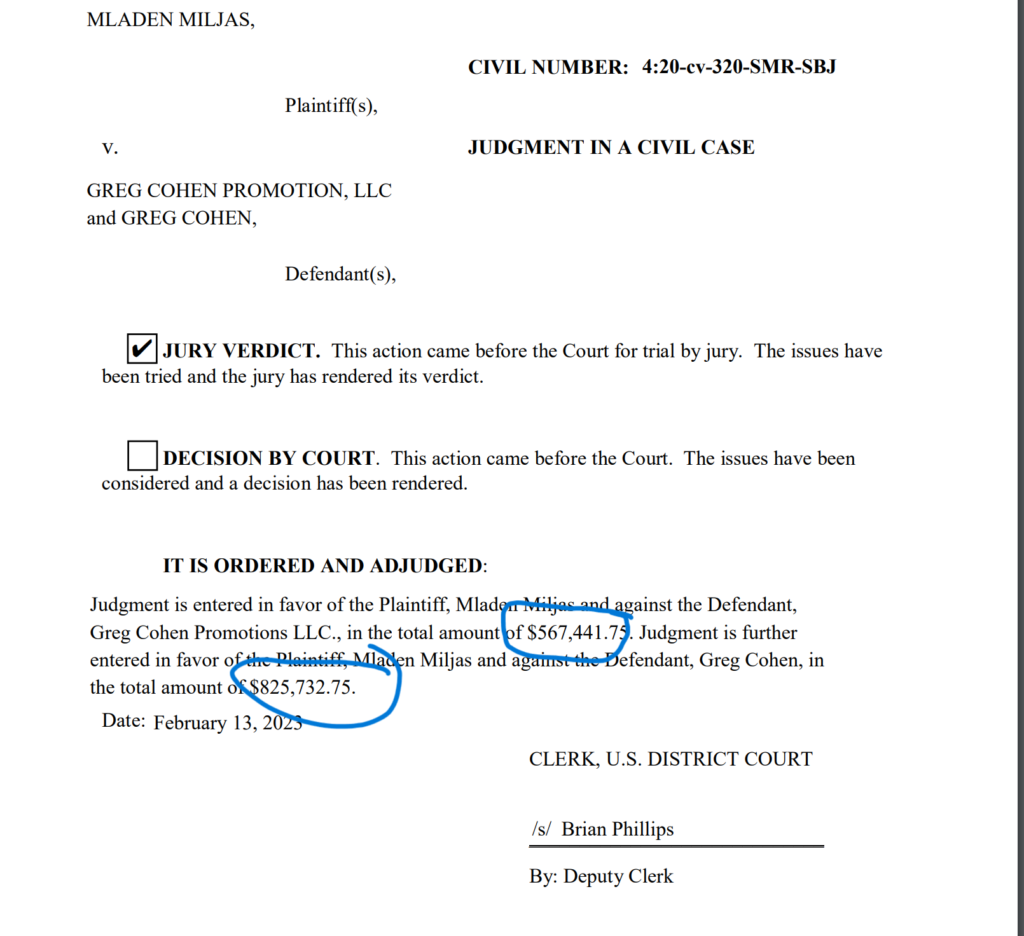A jury in Iowa found boxing promoter Greg Cohen liable for breach of contract, violations of the Ali Act, fraudulent inducement and tortious interference with business relationship to his former heavyweight Milad Miljas. The jury award the Canadian Heavyweight over $1 million.
The lawsuit stems from Miljas’ lawsuit in which he claims that Cohen breached his managerial contract fighter by mismanaging his career which included the failure to provide him with quality opponents, the allegation that he did not provide the mandatory number of fights to Miljas within the timeline in the contract as well as multiple issues which he claimed violated the Ali Act. The first was not disclosing the amount of money deducted from Miljas’ fight purse. The second was not disclosing a financial relationship with a manager appointed to guide Miljas after signing with Cohen as promoter.
Miljas claims that Cohen materially misrepresented to him that he could guide his career and provide him quality fights that could make him champion. This fraudulent inducement claim is based on his reliance on Cohen.
During the time being represented by Cohen, Miljas was matched up with fighters which would not help give his career a boost. Moreover, these fights were not given to him in a timely manner. According to his contract he was to have four fights a year but was given just four fights in two years.
He sent a Notice to Cure to Cohen to advise of a potential breach with the possibility that the promoter rectify the situation. The notice was a part of the contract. Cohen responded to Miljas by denying any breach of contract occurred. He also cited a fight in which Miljas turned down.
While Miljas claimed that he had terminated the promotional contract after Cohen’s response, the promoter let it be known within the fight community that Miljas was still under the promotional banner of Cohen. Thus, other promoters did not want to sign the heavyweight for fear of being sued by Cohen for interfering with his contract.
After Miljas filed the lawsuit in federal court in Iowa, his lawyers filed a Preliminary Injunction requesting a court determination that the fighter was no longer under contract with Cohen. Miljas prevailed.
The trial brief, typically set the stage for what each party will present at trial. Miljas trial brief indicated that through expert testimony it determined that he lost $670,266 due to Cohen preventing him from signing with another promoter.
Miljas also presented evidence that he had secured an offer with Queensbury Promotions to fight under their banner and was to earn $169,200 in purses in the first year. However, Cohen nixed the deal by threatening Queensbury stating that Miljas was still under contract.
In his trial brief, Cohen argues that Miljas failed to mitigate his damages and lost purses due to the fact that he had only one fight since the preliminary injunction he secured in 2020. In that fight he fought a 39-year-old fighter who had been inactive in recent years. Cohen claimed that he was attempting to set up Miljas record for bigger, more attractive, larger purse fights. The quality of fighters Cohen had set up for Miljas was a plan to have him fight WBA Heavyweight title holder Manuel Charr. However, due to the strained relationship with Miljas, the fight did not happen.
In addition, Cohen claimed that Miljas return to Canada hurt his ability to set up fights for him. The trial brief indicates that Miljas would not return to the U.S. until he received a specific visa.
The defense stressed the fact that they wanted to keep Miljas active, but unforeseen circumstances and Miljas own doing (i.e., returning to Canada) prevented fights from happening. Cohen also
As for the Ali Act defense, it appears Cohen argued a technicality to the law which makes a firewall between manager and promoter valid if it is a 10 round fight. He also claimed that documentary evidence would show that disclosures were made to Miljas.
The jury did not agree with Cohen’s defense as exemplified by some Jury Questioning before the verdict and then the verdict.
Cohen will have 30 days from the date of the jury verdict to file an appeal or request other relief such as a motion for new trial and/or a request to reduce the award.
Regardless of the ultimate outcome, this is pretty big legal news because the Ali Act rarely goes to verdict. It is even more rare that a boxer comes up victorious.



Leave a Reply